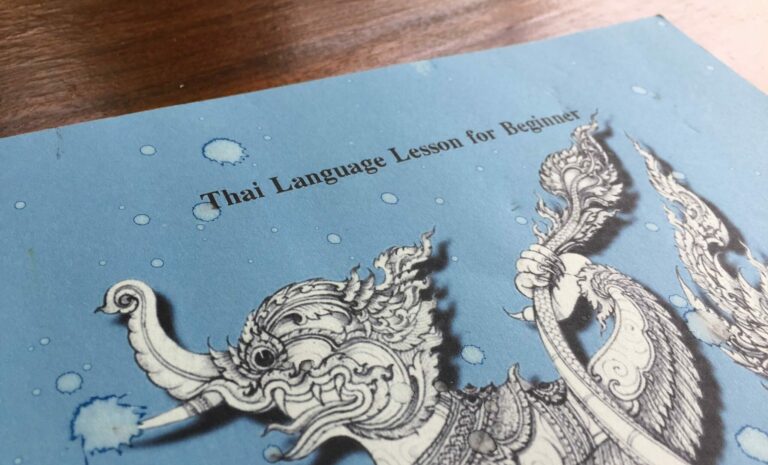Want to know how to learn Thai fast? While, the idea of learning Thai might seem like a slow and overwhelming project – it doesn’t have to be.
Many people’s first forays into learning to speak a second language are often unsuccessful and it dints their confidence for the future.
Maybe you learned French language at school for five years and the only thing you got from it was being able to stumble your way through ordering a beer.
This may have left you feeling that learning a new language to a high level is completely out of the realms of your ability and only something that people who have a special “language-learning gene” can achieve.
If you feel like this, it’s understandable if you’re struggling to find the motivation for getting started.
However, there’s some good news – you don’t have to have to be a language-genius in order to successfully learn Thai (OK – maybe it helps a little).
But by far the more important thing that will determine your success at learning Thai is a smart learning approach which means learning the right things in the right way and having a consistent learning schedule.
This means that ideally you would be doing a little each day (even if it’s as little as 15-20 minutes).
Just like with physical exercise – if you get in to the habit of doing it daily, it becomes easier.
But if you have a break for a few weeks, it’s really hard to motivate yourself to get started again, and when you do, it often feels like you’re starting from scratch.
Sure, it will take a little bit of hard work on your part to learn Thai, but the end result will be worth the effort.
In this post we’re going to give you some of our top tips that will help you to learn Thai fast, effectively and hopefully – maybe even help you to enjoy your Thai language-learning journey (at least more than you enjoyed learning French at school anyway).
Why You Should Learn Thai
If you plan to visit or, indeed live in Thailand, you might ask yourself – do I need to learn Thai? The answer to this really depends on what you want to get out of your time in Thailand.
It is certainly possible to get by in Thailand and just speak English, particularly if you’re planning to stick mostly to the well-trodden tourist or expat areas.
Though the more you venture outside of these areas, the more difficult it will become to rely on only speaking English.
Connect with locals
Learning to speak Thai, or any new language will go a long way towards helping you understand the people and culture.
Speaking Thai will bring you the gift of being able to communicate with people from a culture very different to your own.
Understand Thai culture
Thai, like all languages, isn’t solely about communication.
Culture and language are inextricably tied together in such a way that making any real progress in learning a language like Thai also helps you better understand how Thai people think about and the world.
Learning the Thai language will give you a deeper insight and appreciation for Thai traditions, art, religion and the history of the Thai people and their country.
See the “real” Thailand
Learning the Thai language will also give you the opportunity to learn about a different side of Thailand, outside of the tourist bubble and connect with the people and culture in a way that is out of reach to most tourists.
We all know that one thing that Thailand is famous for is it’s wild nightlife, crazy beach parties, etc etc.
Unfortunately, this is the only side of Thailand that many tourists will get to see – yet it’s only found in relatively small pockets of tourist bubbles and doesn’t represent the wider Thai culture or indeed Thai people.
When you get outside of the tourist areas, you will find a rich (and fairly conservative) culture which contrasts sharply with the hedonism of some of the tourist bubbles.
If you can learn to speak Thai at a decent level – it will open doors and you may see a side of Thailand that you didn’t even know existed.
Do I Need to Learn to Read Thai Script?

As an English speaker, learning to read and write Thai script might seem like an intimidating task, but it’s absolutely essential if you want to be able to achieve fluency in Thai.
We would recommend that you start learn to read as early as possible as it makes everything else much easier down the road.
It will also help to stop you picking up bad habits early on with pronunciation and tones.
Learn correct pronunciation
Without learning to read Thai, it’s very difficult to grasp or tell the difference between the sounds of the Thai consonants and vowels.
You’ll probably end up mispronouncing Thai words without even knowing that you made a mistake.
The Thai-English transliteration systems that exist simply do not accurately reflect the sounds of the Thai letters that they are trying to represent.
If you don’t learn to read the Thai script then learning new words will be much more difficult as you often can’t be sure which Thai vowel or consonant is actually used – and even if you did figure this out – many of the characters in the Thai alphabet produce sounds that are not used in the English language anyway.
So, in order to reach any reasonable level of competency in Thai, you’ll need to learn the Thai script.
Learn Thai tones
Thai is also a tonal language – which means that each word is assigned one of five tones.
This means that if you say the wrong tone for a Thai word then it can change it’s meaning.
The Thai tones rules are inherent in the Thai script so when you read a Thai word, you will know what the tone is.
So if you cannot read Thai then you will just have to remember the correct tone for each word.
You might be able to order a coffee in Thai with crappy tones but if you want to have a real conversation, it’s going to be difficult for Thai people to understand what you’re talking about if your tones are all over the place.
You can do it!
Fortunately, learning to read in Thai is not as difficult as many people think and it’s certainly possible in a matter of weeks if you consistently set a bit of time aside each day to practice it.
And soon, those strange squiggles on the page should start making a whole lot more sense.
Don’t know where to begin? Try an online Thai course that can teach you all the basic Thai skills you need to start speaking.
Immerse Yourself in Thai Language
It’s amazing watching children learn to speak a language.
The average five year old Thai child can probably speak much better Thai than the average expat who has lived in Thailand for five years.
It’s not necessarily because children are more skilled at learning languages than adults, it’s because they are completely immersed in Thai language, Thai culture and surrounded by Thai people – they read Thai books, they watch Thai TV, their whole family speaks Thai with them.
They also have no other language to fall back on – if they want to make themselves understood, they have to speak Thai.
If you are a native English speaker, it’s easy to revert back to speaking English if you feel too shy to speak Thai or if you’re not sure how to say something correctly.
But imagine if we didn’t have the English language to fall back on – we would be forced to find a way to make ourselves understood in Thai.
Imagine how much more quickly your Thai language skills would improve if it was your only method of communication.
If you want to learn to speak Thai fluently – try to be a child in your approach to Thai language.
Use it as your only means of communication in your day to day life.
Force yourself to speak Thai in your every day interactions with people; order your food and drinks in Thai, speak Thai at the bank, try and make small talk with the Grab driver and so on.
If you can’t figure out how to say what you want to say or if you make a mistake then make a note of it and then when you get home, figure out the correct way to say it.
The good thing is you don’t even need to be in Thailand to immerse yourself in Thai language and culture (although that is certainly an advantage!) – you can also learn Thai by immersing yourself virtually.
There’s tons of free online media that you can immerse yourself in:
- Listen to Thai language talk radio.
- Find some Thai YouTubers speaking Thai on a topic that you’re interested in.
- Watch Thai language news.
- Read Thai language newspapers online.
- Try to read Thai blogs or forums like Pantip.
Learn the Right Thai Words (time efficiency, 80/20)
Use your time effectively and learn the most commonly used words first.
The 80/20 principle also applies to learning Thai; to be able to speak Thai at a native level, you will need to learn many new words; but to achieve conversational fluency in Thai, you will only need to know a couple of thousand of the most common Thai words as these will make up the majority of everyday conversations.
Many Thai words are only used in written or very formal spoken Thai and while you might want to learn these words later on in your Thai language journey, it doesn’t make much sense for a beginner to be learning Thai words with such low frequency.
For example the word the word กิน (kkin) is the Thai word for “eat” which is used in every day speech.
However, the very formal word for “eat” in Thai (and the word that you might see in some Thai phrasebooks) is รับประทาน (rap-ppra-taan).
Thai people may use this word in some formal situations, such as a child doing a presentation at school but as a foreigner this word sounds ridiculously formal for almost all everyday situations that you will find yourself in.
So it’s not an effective use of your time to be learning Thai words like this which you will rarely, if ever, use in real life.
Also, try not to just repeatedly grind new Thai vocabulary over and over hoping to remember it.
A good way to learn new vocabulary is to be strategic about the Thai word, or phrases that you want or need to use now by making use of mnemonics such as creating a funny story that helps connect the word to your life.
Set Language-Learning Goals

Now that you’ve decided that you want to learn Thai – it’s important to know what it is that you actually want to achieve.
If your goal is just “learn the Thai language” then how do you know what steps you need to take in order to achieve this goal and how will you know when it’s complete?
Be specific
Setting big, general goals like “learn Thai” can be overwhelming and leave you unsure of what you actually need to do on a daily basis to hit your goal.
It’s good to dream big and have an ultimate goal that you want to achieve but you need a clear plan about how you’re going to get there.
This will involve breaking your main goal down into smaller short term goals with tangible outcomes.
Set goals of what you want to achieve by the end of each day or week.
Write it down
Once you’ve decided on your you need to write it down.
This obviously stops you from forgetting your goal but it also helps to turn that vague plan to do something in to something more concrete and real which in turn will hopefully make it more likely that you will follow through with it.
Time-bound
Set a reasonable time-frame for achieving each of your goals.
What do you want to achieve and by when?
Also be realistic about how much time you are able to dedicate to learning Thai each day.
If you’ve set yourself the goal of doing 30 minutes per day and you’re finding it difficult to stick to that, then just do 20 minutes per day.
Don’t put too much pressure on yourself and stress yourself out over it, you’ll quickly lose motivation that way.
Just like with exercise, it’s more important to be consistent over a long period of time than it is to have one big session.
Practice with Native Speakers

Do you already live in Thailand? Bonus! Start a conversation with the Thai restaurant staff (when they’re not busy), talk with your Thai friends, join a local club or meetup group and practice speaking Thai with all the Thai people you meet!
You may have to push yourself out of your comfort zone a little but your future (Thai speaking) self will thank you for it.
Do a language exchange
Of course, you could also find someone to do a one to one Thai-English language exchange with.
This doesn’t need to be a Thai teacher – lots of Thai people are keen to improve their English skills and are willing to do a language-exchange.
It doesn’t have to be a formal learning session either – you can just meet up over a coffee once or twice a week for an informal chat to help each other practice the other’s native language – although it does help if you prepare a topic that you want to talk about in advance.
If you’re a beginner at learning Thai then it’s probably best if you find a Thai language buddy who is also at a beginner level in English.
hat way you will be less able to rely on reverting to speaking English to make yourself understood – instead you’ll need to figure out a way to say it in Thai!
That might seem a little scary at first but you’ll soon start to pick up enough words to have a basic conversation on a few different topics (remember the 80/20 principle!).
At this stage, don’t worry if you make mistakes, it’s much better to try and say something in Thai and get it wrong rather than not try at all.
And you can always figure out the correct way to say something later.
Speak with Thais online
If you don’t live in Thailand, no worries – there are still ways that you can find native Thai speakers online.
Make use of resources like Italki or other language exchange/tutor sites, where you can book one to one video call lessons with a native Thai speaker.
Best Way How To Learn Thai Language Fast? – Jump In!

If you want to learn Thai language fast, now is the time to take action and put all of these tips in to use.
You’ll want to make sure to build up some momentum, have a daily habit and make use of online resources.
It’s not easy and it won’t happen over night but with consistency and a little bit of effort and pushing yourself out of your comfort zone, it’s certainly possible to attain conversational fluency in Thai.
Go out, find a good Thai course to teach you the basics, and start speaking Thai.
Remember, just practice a little bit every day and don’t give up and you’ll be speaking and reading Thai before you know it!






